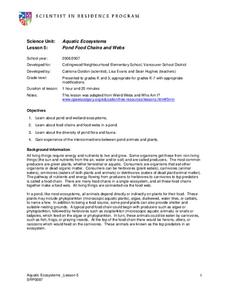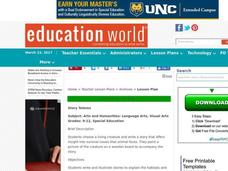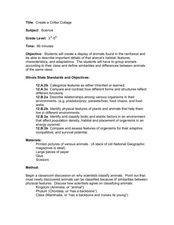Curated OER
Constructing A Food Web
Students identify and explain the relationships within a food web. They use index cards to glue pictures of producers and consumers. On the back of the card, students name the organism, list the type of biome in which it is found.
Curated OER
Food Webs
Students recognize interdependence in a food web by using yarn and notecards to create a food web and discussing what would happen if one of the organisms from a certain trophic level is removed.
Curated OER
Discovering New Species
Students identify animals observed by Lewis and Clark while evaluating the animal's habitat and describing the animal's behavior. Students construct a food web mobile to illustrate the animal's position in the food web in the 19th...
Curated OER
Amazing Animals
Students, in beginning and advanced beginning ESL levels, use English in an animal lesson.
Curated OER
Food Webs
Learners research what food is eaten by the following organisms: penguins leopard seals, krill, elephant seals, petrels, albatross, fur seals, squid, insects and grass. They make a food web using the data they have gathered.
Curated OER
Introducing Habitats and Biodiversity
Students identify habitats in Arizona. Theys define and illustrate a food web, and explain the importance fo biodiversity.
Curated OER
Food Web Mystery
Students describe typical marine food webs, and explain why food is generally scarce in the deep-ocean environment. They discuss reasons that seamounts may support a higher density of biological organisms than would appear to be possible.
Curated OER
Protecting Our Planet
Students examine the impact of pollution. In this pollution lesson, students watch Protecting Our Planet, then participate in a simulation of the effect of pollution on a variety of organisms.
Curated OER
Food webs and Energy Flows
Students become familiar with food chains. For this food chains lesson, students understand that as consumers eat other consumers energy is passed. Students understand the vocabulary associated with food chains.
Curated OER
Aquatic Ecosystems
Students study ponds and wetland ecosystems and examine the food chains and webs in them. In this aquatic ecosystems lesson plan students answer questions about the diversity of the flora and fauna in a pond.
Curated OER
Who's for Dinner?
Fifth graders examine life systems within different biomes. They choose paper plates with the names of animals on them. They research the animals, write reports and draw pictures of them. They create a food chain model by arranging the...
Curated OER
Illinois Wild
Sixth graders identify different animals native to Illinois. They research a specific animal to study more about its characteristics, examine what makes a habitat, and recognize the difference between a food web and food chain.
Curated OER
Lesson Plan for Cricket's Supper
Interested in a special folktale to read with your class? Then this lesson might be for you. Readers will build an understanding of the food chain while creating a storyboard that includes the characters, setting, and plot of the story....
Desert Museum
Daisy Ecology
Here's a fine lesson that combines poetry with life sciences. Learners carefully listen to a poem that's all about a food chain. As the poem is read, learners name the producer, the herbivore, the carnivore, and the omnivore. Lots of...
Curated OER
it's Lonely At The Top
Students explore the differnences between food producers in food webs and food consumers in food chains. Behavioral choices of primary and secondary consumers such as herbivores, vegetarians, carnivors, and omnivors are analyzed.
Channel Islands Film
Natural Resources, and Human Uses of Plants and Animals
As part of their study of the restoration projects on Santa Cruz Island, class members demonstrate their understanding of the connections among plant life, animals, and the actions of humans by crafting a model that reveals these...
Curated OER
Secrets of the Ocean Realm - Survival in the Sea
Students determine the sequential links in a marine food chain and identify the roles that various organisms play in this chain. Students develop charts as visual aids for illustrating marine food chains.
Curated OER
Vocabulary: Kansas Prairies
Students explore the ecosystem by reviewing scientific vocabulary terms. In this environmental awareness activity, students identify the differences between abiotic and biotic factors and their relationship to the Earth. Students define...
Curated OER
Plankton
Students explore the attributes of plankton. In this plankton lesson, students read This is the Sea That Feeds Us and discuss food chains. Students discover the differences between phytoplankton and zooplankton as they examine the...
Curated OER
Dinnertime for Animals
Is a deer an herbivore? What about a spider? Experiment with the food chain in an interactive science experiment. After listing the herbivores from a selection of animals, third and fourth graders compare the skulls and teeth of...
Curated OER
Story Totems
High schoolers write and illustrate a story to describe the habitat and life cycle of a selected animal. They write and publish their story, and create a picture of the animal on a wooden board.
Curated OER
Create a Critter Collage
Students create a collage. In this animal classification lesson, students discuss why and how scientists classify animals. Students view pictures of different animals and decide which class each animal belongs to. Students compare...
Curated OER
Striking a Balance
Students participate in an activity that demonstrates the principles and dynamics of food chains. They discover that the sun's energy is captured by individual plants and transferred to animals.
Curated OER
Up the Down Tree House
Learners investigate the decomposition process. In this ecology lesson, students participate in a play, "Up the Treehouse" where the main idea focuses on a decomposing tree and how food chains are effected by decomposition. After the...

























